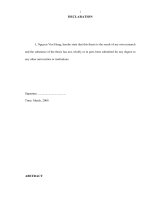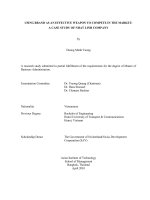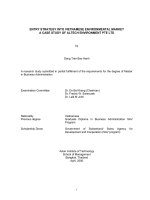Case Study Starbucks Turkey
Bạn đang xem bản rút gọn của tài liệu. Xem và tải ngay bản đầy đủ của tài liệu tại đây (57.53 KB, 6 trang )
Case study: Starbucks Turkey
Date: June 17th, 2020
1. Has Starbucks has done well in Turkey? What are some of the common growth drivers
in terms of consumer characteristics, market characteristics, and entry strategies
across USA and Turkey that might account for Starbucks’ success?
Starbucks' goal is to create an environment interwoven between home, work and a coffee
shop, so when entering a Starbucks store anywhere in the world, customers always feel an
atmosphere that incredibly comfortable and friendly, a famous characteristic of the world's
largest coffee chain.
Starbucks was able to capture a large portion of the market by catering specifically to a
clearly defined target audience. With the rapid expansion, Starbucks targeted customers of some
age group and expanded throughout both the US and Turkey both in the US and Turkey. In fact,
there are a big number of coffee drinkers in urban areas where most of educated people,
employees and working professionals live in.
The target customers of Starbucks are Millennials and Gen Z, which range from the age
of 16 to 40 in both females and males. Its primary target market is adults aged 25 to 40, who are
working and have high income or professional careers. In the US market, they account for nearly
half of their total businesses. Starbucks appeals to consumer age groups through its space and
consistent modern design in its advertising and decoration. Customers are usually those with
relatively high incomes, professional careers and focus on social welfare. Turkey’s median of its
population is 28, so it falls into Starbucks’ primary target market. In addition, Starbucks also
targets students and teenagers because “tens of thousands of western educated young people that
got exposed to take-away style drinking habits as in the U.S. or Europe”. Students and teenagers
make up a large part of Starbucks's customer base in Turkey since “the country’s population was
young... 25 percent of the population is below 15 years of age”. Starbucks is a place where
students can study, take notes, chat with friends, and meet people. It attracts these customers
directly through social networking, and actively builds a dynamic, youthful image.
To determine the number of potential consumers in Turkey’s market, they started from a
big city, Istanbul. Based on the geographic factor, the country’s urbanization rate was high,
approximately 75%-80% of the population now lived in urban areas. Starbucks focuses on its
market share to those with stable incomes and in urban areas. That is the reason why its first
store was open in Istanbul, one of the busiest, top-end streets of Istanbul, the Bagdat Street,
which was the ‘in’ place for the trendy and wealthy ‘Istanbulites’. Istanbul is the largest city in
Turkey in terms of population and economy, size and one of the most important economic and
cultural centers in Turkey. It inherently attracts so much attention from the locals, tourists,
passersby as well customers and the location is always crowded with people.
The cultural factor is also an advantage for Starbucks to enter Turkey. In Turkey, coffee is
not only a simple culinary culture and an important part of etiquette but also a drink for each
other’s fortune. Since the days of the Ottoman Empire, coffee has played a significant role in
Turkish lifestyle and culture. Coffee became part of the ritual from court to marriage, even the
marriage was decided through formal coffee receptions. Women of this time were well trained in
making coffee, and her future husband also commented on her quality by preparing coffee.
Coffee has become a unique cultural feature of this country, which makes a good foundation for
Starbucks to penetrate its industry here.
2. What are the core, actual and augmented product benefits offered by Starbucks in
Turkey?
Starbucks brand is the leading coffee chain brand in the world. Established in 1971 in the US,
Starbucks was then just a small shop specializing in selling coffee beans and roasting equipment.
Everything changed when Howard Schultz, CEO of Starbucks, joined the company in 1982 as
the Director of retail and marketing operations. He came up with the idea that the company
should sell both coffee beans and ground coffee after realizing the unique way coffee is served in
Italy. Starbucks became the most successful coffee chain in the world with the with premium
coffee as their core product. It has never claimed to sell cheap coffee despite this “there was a
minimum threshold income-level above which people started to spend a little on extras – and
dining and drinking out was considered a big treat in Turkey”. By offering their own style of an
enriched upscale coffee experience, Starbucks still stands out from other competitors, locals with
customer services and ambience.
Speaking of the difference, Starbucks also develops other product lines that are suitable for a
large number of customers who prefer not to drink coffee but wish to experience Starbucks
coffee space. They offer a diverse types of drinks with high quality. In Turkey, they “offer more
than 30 varieties of drinks, including espresso-based coffee drinks, teas, iced coffees, made from
up to 15 types of coffee beans, food items, and merchandise goods, the only difference compared
to all other Starbucks’ in the world was Turkish Coffee on their menu”.
As with other markets around the world, Starbucks Turkey also continues to place their
recognizable logo front and center of the cup and bag. The packaging of their takeout coffee is a
simple, elegant plastic cup and a paper cup with the Starbuck mermaid logo. It is a great way to
keep customers engaged with the brand. Customers, especially “tens of thousands of western
educated young people that got exposed to take-away style drinking habits as in the U.S. or
Europe” enjoy having their food and drinks enhanced by this Western, eye-catching packaging.
Customer service is also an important factor to attract more loyal customers as well as add
value to the company. Understanding the importance of service, Starbucks around the world and
in Turkey always hires their employees and trained them to ensure excellent service will be
served, not only just coffee cups.
Another product that Starbucks offers to Turkish market is the enjoyable and relaxed
atmosphere. Starbucks is neither a home nor a workplace, but a community space where people
can meet and work. Buying a Starbucks cup also means that consumers have a cozy, pleasant
workplace.
3. Is Starbucks using a standardization, localization or hybrid marketing strategy in
Turkey?
Starbucks is using both standardization and localization marketing strategies in Turkey. Product
standardization strategy is on in which a company produces a set of products of the same
standard, same design and same quality. Since Starbucks is a global coffee chain, it must follow
the standard to (1) adapt to the lifestyle of its original target customers, wherever they are in the
world; (2) maintain product and service quality due to standardization and mass production; (3)
take advantage of finance and technology of the company; (4) strengthen the brand to other
competitors in Turkish market. However, Starbucks still has to localize their marketing strategy
to tailor to Turkey market, beverage menu in particular. They include Turkish coffee which has
“a major role in the culture meant that they needed to adapt to the customers’ needs and wants”.
Localization and standardization strategy can be achieved to a certain extent depending on the
objective and cultural conditions of each country. Since coffee became a ritual part of Turkish
culture, it should be included to serve the needs of the local people.
4. Using the product/market expansion grid shown in Figure 2, apply the growth
opportunities available to managers in Starbucks Turkey.
Any business usually spends time thinking about how to increase their profits. They will
therefore have hundreds of ideas to compare and implement, including developing new products,
entering new markets, new channels, or launching new marketing campaigns. Using the
product/market expansion grid helps business to start considering their options. This tool will
select the ideas that best fit a business’s current situation. This grid indicates that a business can
grow in 4 ways, and also it shows the risks in each way. Each different strategy has different
risks, and each time a business moves a new cell (horizontal or vertical), the risks are increased.
Starbucks managers can enter a new market with existing products or develop a new product to
the current market. Perhaps the new market may have completely different needs and
motivations than what the mangers think, or a new product fails, but if Starbucks wants to
develop in Turkey, they must take risks.
Existing Products
New Products
Existing
Market Penetration
Product Development
Markets
Coffee and other beverage, open in
Add more prepacked cold drinks
major neighborhoods
New Markets
Market Development
Diversification
Open in other areas such as the
Using the mobile app to place orders
suburbs
and
cooperate
with
Uber
eats,
Postmates, Doordash, …
When life is getting busier, people expect to have their service fast and convenient. To
develop new products and existing markets, Starbucks can make some changes to its current
product strategy by adding more prepacked cold drinks like teas, energy drinks and cold brewed
coffee, so customers can just grab their product in the fridge and get going to their work without
waiting for drink preparation.
According to the case study, Starbucks Turkey only focuses on major neighborhoods. In a
market with too many players, Starbucks needs to expand brand awareness to the new market as
a way to maintain its dominance and growth momentum. In fact, after surveying the consumer
behavior and the market in major cities in Turkey, Starbucks should expand its stores to other
locations including suburban areas to raise brand awareness throughout the country. There will
be always be numbers of people who live far away from major cities and want to taste Starbucks
coffee, a Western product. Also, Starbucks can open stores to most attractive tourism areas,
which can get attention from tourists, passersby as well as their customers from other countries.
Starbucks managers can plan to drive the number of customers using a mobile app to place
orders as well as to increase the loyal customer base. They can also apply business-to-business
model, which is cooperating with other apps like Uber Eats, Postmates, Doordash and others to
promote their sales.
5. What marketing recommendations would you make to Starbucks in Turkey to help
them sustain and/or improve sales growth, and remain competitive as they look
towards the future?
To sustain and thrive Starbucks’s sales growth and its position in Turkish market, Starbucks
has to protect its core values. A core value is considered and essential and long-term principle of
a business. It is a set of rules that affect the thinking and actions of any members in Starbucks.
The core value of Starbucks is keeping their commitment in product quality and offering
customers excellent services and experiences. Every business must represent something, for
Starbucks, it’s famous for the “Starbucks Experience”. The core of the business must be a
product bearing bold identity, a product that surpasses the wishes of customers, maintaining the
quality of product and service at the same time. To control the quality, it’s insisted on keeping the
coffee throughout the process, from fresh coffee beans to a steaming coffee cup; it is a closed
integration process. To maintain its excellent service, any new Starbucks employees need to be
trained carefully, so that every cup of Starbucks coffee has the most authentic values and that
customers received the same experience every time they walked in the store or any Starbucks
store in Turkey.
Theodore Levitt defined marketing myopia as providing needs and experiences to customers
through their products is the foundation for any marketing strategy. Thereby, Starbucks Turkey
always needs to pay attention to customer’s needs as well as local culture. Marketers have to give
customers what they want and what they expect. For example, for health and weight reasons,
more and more people try to avoid whole milk. However, non-fat milk is bland, which changes
the taste of Starbucks coffee. The mission is to give customers the right to choose their product
and the right to enjoy coffee the way they want, so Starbucks has to serve non-fat milk to pleases
their customers. In addition, Starbucks Turkey can have specialty drinks related to Turkey’s
traditions. Even though it can only be sold for a short period of time, but it shows that Starbucks
is keeping up with the local tradition. Indeed, any changes for Starbucks to fit in the Turkish
market, they will always have to follow the true value of its premium coffee.
References:
Case Study Starbucks Turkey









